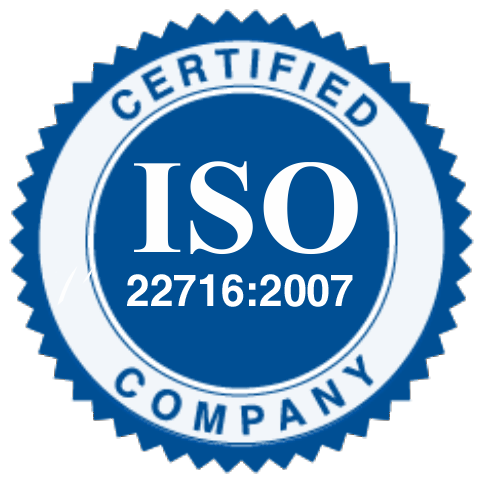Kosher Certificate
Kosher is a Hebrew word that means fit, proper or correct. We often use it in American English to mean “cool”, very good or excellent. From a Jewish perspective, it is mostly used to describe food and drink that complies with Jewish religious dietary law. The laws that provide the foundation for a kosher dietary pattern are collectively referred to as kashrut and are found within the Torah, the Jewish book of sacred texts. Instructions for practical application of these laws are passed down through oral tradition.
What are the Kosher Laws?
The laws of kosher date back to the time of Moses, over 3300 years ago. Kosher dietary laws are comprehensive and provide a rigid framework of rules that not only outline which foods are allowed or forbidden but also mandate how permitted foods must be produced, processed, and prepared prior to consumption by someone of the Jewish faith.
Here are the basics of Kosher Laws:
Here are the basics of Kosher Laws:
Animal Products
To be considered kosher, animals must fall into one of the following categories, and meet certain requirements.
Certain animals may not be eaten at all, including pigs, shellfish, rabbits, and reptiles.
Mammals that have split hooves and chew their cud, (including cows, sheep, goats, bison, and deer) are kosher.
Fish must have fins and removable scales to be considered kosher.
Specific kosher bird species are listed in the Torah, but there is more ambiguity about the requirements a bird must meet to be considered kosher. Generally speaking, birds of prey are not kosher
Milk and eggs from kosher animals are kosher. Eggs must generally be checked to ensure they do not contain blood, which is not kosher.
Of the animals that may be eaten, the birds and mammals must be slaughtered in accordance with Jewish law, a process known as shechita. Certain parts of permitted animals may not be eaten. Also, all blood must be drained from the meat or broiled out of it before it is eaten.
Meat and Dairy
Any meat (the flesh of birds and mammals) cannot be eaten with dairy. Utensils that have come into contact with meat (while hot) may not be used with dairy and vice versa. In addition, utensils that have come into contact with non-kosher food (while hot) may not be used with kosher food.
Pareve Foods
Kosher food is divided into three categories: meat, dairy, and pareve. The pareve foods are considered neutral and can be eaten with either milk or meat.
All fruits, vegetables, grains, pasta, nuts, beans, and legumes are kosher. Note, however, that except for a small number of locust species, bugs are not kosher. As a result, the use of certain fruits and vegetables is now considered controversial in certain Orthodox circles, over concerns about insect infestation.
Eggs, fruits, vegetables, and grains are considered pareve, or neutral, and can be eaten with either meat or dairy. Fish is also considered pareve, but some kosher observant Jews do not cook or eat fish with meat.
In order for wine to be kosher, of course it must contain only kosher ingredients. And according to traditional Jewish law, once the grapes are picked and brought to be crushed, only Shabbat-observant Jews can be involved in making the wine. From crushing to bottling, kosher wine must be handled exclusively by observant Jews.
Why the strict rules about only Jews preparing wine? Because in the past wine was often used by pagans in their offerings to idol gods. When something good happened, you’d pour some wine out on the ground as a symbolic thank you (if you were an idol worshipper, that is). The rabbis who set up the rules for kosher wine wanted to make sure that Jews never got a glass of wine that had been associated with an idolatrous offering, so they required that only Jews be involved in handling kosher wine.
Although the essential laws have not changed since they were given at Mount Sinai, their application to issues presented by modern processing requires expertise in both kosher law and food technology.
Although the essential laws have not changed since they were given at Mount Sinai, their application to issues presented by modern processing requires expertise in both kosher law and food technology.
What Does It Mean to Be Kosher Certified?
Kosher supervision means that a qualified Rabbi or Rabbinic organization supervises the production of a food item to ensure that the product is kosher (prepared in accordance with Jewish dietary law).
In general, supervision focuses on two areas:
- Ingredients – All ingredients and sub-ingredients used in a product must be kosher.
- Equipment – Equipment must have a kosher status and cannot be used for both kosher and non-kosher production.
Supervision is established by creating a written list of kosher ingredients that may be used in the plant and by approving the production process. A trained rabbinic field representative visits the plant unannounced on a regular basis to verify that there have been no changes that would compromise the kosher status.
There are several kosher certification organizations out there. Symbols you’ll likely see in the United States are OU, Star K—which is the organization Heart of the Desert uses, Kof-K, and OK.
There are several kosher certification organizations out there. Symbols you’ll likely see in the United States are OU, Star K—which is the organization Heart of the Desert uses, Kof-K, and OK.
What is the Purpose of a Kosher Certificate?
A kosher certificate confirms that a product is properly vetted and monitored from the perspective of kosher law. It also alerts customers to any specific kosher category the product might fall under, such as dairy, meat or Passover status. For businesses, kosher certification is a regulatory seal which increases the appeal of their products in the wider market and is a huge selling point. Products are endorsed as kosher only when they carry a Kosher compliance company’s logo.
So Why Get Certified?
The dynamics of the kosher market are poorly understood. No doubt, the initial demand for kosher products comes from committed kosher consumers. As reflected in a popular ad of the 1970’s, “You don’t have to be Jewish to eat Levy’s rye,” the kosher market extends far beyond the Jewish population, and includes Muslims, Seventh-day Adventists and vegetarians who purchase kosher products for religious or moral reasons.
Add to this people with milk related allergies, health-conscious individuals looking for GMO-Free and organic foods as well as discerning consumers who view the reliable kosher symbols as signs of health, quality, and integrity, and you have a large pool of devoted consumers.
Add to this people with milk related allergies, health-conscious individuals looking for GMO-Free and organic foods as well as discerning consumers who view the reliable kosher symbols as signs of health, quality, and integrity, and you have a large pool of devoted consumers.
Our Services
Contact Us
- 19 Mohamed Abdullatif St. Off Zaghloul - ElHaram - Giza - Egypt
-
(002)02233846193
(002)01271203056 - certification@Mas-esc.com
Our Brochures
View our 2023 Medical prospectus of brochure for an easy to read guide on all of the services offer.





